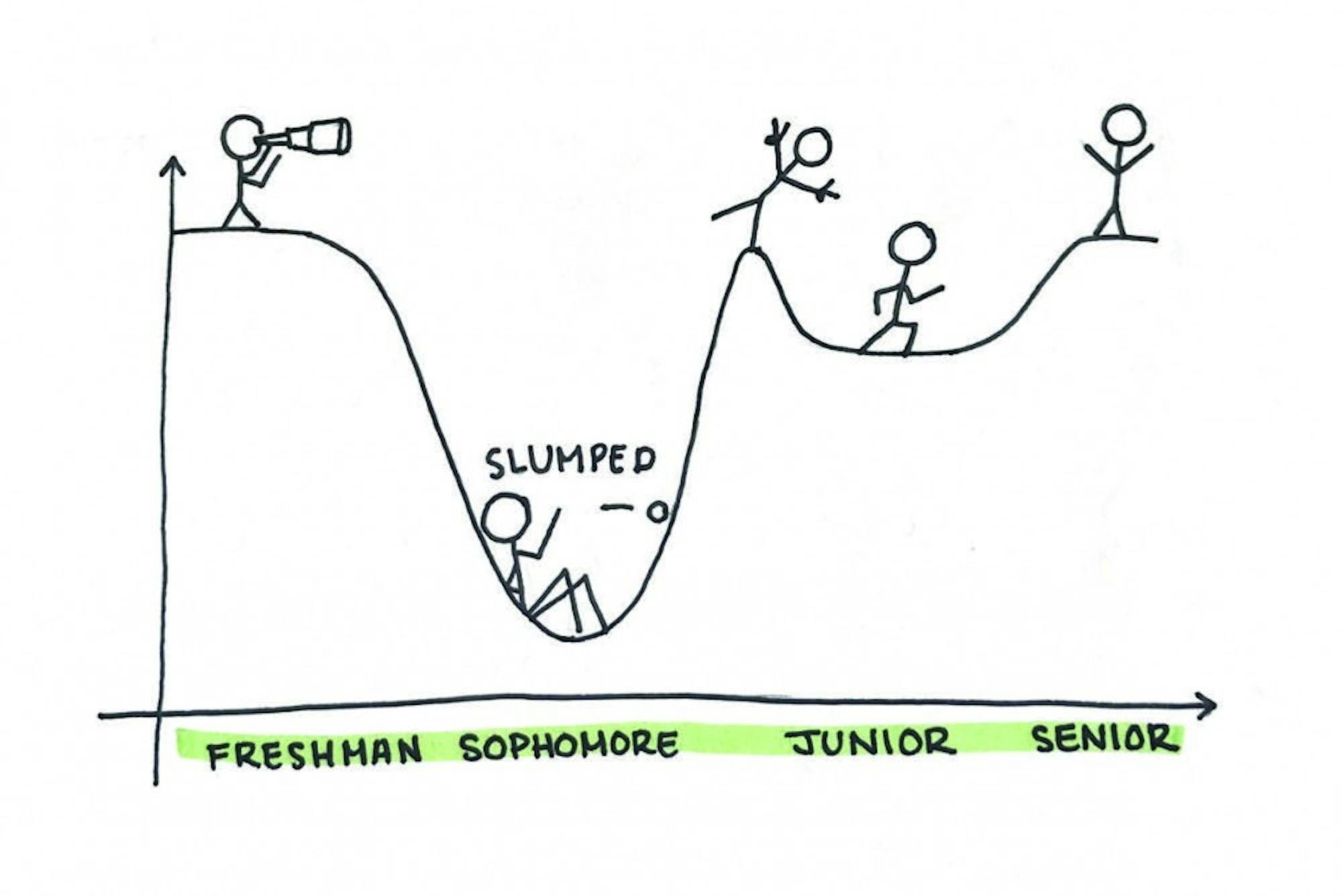For all intents and purposes, the word “sophomore” refers to a second-year high school or college student. However, a quick google search reveals that the word has a more meaningful etymology. “Sophomore” is a hybrid of the Greek words sophos (meaning wise) and moros (meaning foolish). So, where exactly does that leave us sophomores? We are stuck somewhere between cleverness and senselessness. Misguided by the illusion of maturity, we are left to navigate our second year of college.
This confusion felt by many college sophomores leads to the dreaded “sophomore slump,” a phenomenon in which second-year college students cannot sustain the high levels of energy and excitement they had during freshman year. A 2012 study conducted by consulting firm Noel-Levitz found that 25 percent of college sophomores reported either feeling unenergized by classes or not feeling at home while on campus. Clearly, this phenomenon does exist on college campuses, and Dartmouth seems to be no exception.
The sophomore slump is emphasized by the stark differences between freshman and sophomore year. For me, freshman year was a time of excitement and change. It was filled with countless “firsts”: first time living away from home, first roommate, first college party, first homecoming, first Green Key, etc. In a way, coming to Dartmouth was like traveling to a new city, and I was an overenthusiastic tourist. Images of Baker Tower flooded my camera roll in the same way the Eiffel Tower did when I went to Paris. However, with time, these sights no longer seem as impressive to me anymore; they have become ordinary.
Freshman year was also a time of confusion. Yet, that confusion felt not only normal, but encouraged. Orientation Week was filled with assemblies that revealed that, contrary to my belief, not everyone enters college knowing exactly what they want to do. As freshmen, we were encouraged to explore, step out of our comfort zone and discover new interests. So, that’s exactly what I tried to do; I capitalized on my confusion. However, that confusion has yet to subside. One year later, and I still haven’t had an epiphanic moment that suddenly makes the future so clear. To be honest, I don’t think I’m any more certain about my future now than I was last year. The only difference is that now my confusion doesn’t feel welcomed; it feels scary.
Raaga Kannan ’21, an undergraduate advisor, agreed that sophomore year often comes with confusion and a lack of excitement.
“Sophomore year, you’re at this weird place where everything is no longer fresh and new. There’s so much that is in the future. There’s a lot of uncertainty,” Kannan said, adding that choosing a major and potential career prospects were possible sources of these uncertainties.
At Dartmouth, undergraduates declare their majors after the beginning of their fifth term in residence. This just so happens to be during sophomore year and is a major cause of stress and anxiety for sophomores.
Kate Brundage ’22 said that it is hard to stay motivated in classes without having a definite major. She said that she believes it helps to have an end goal to work toward. Moreover, she said that deciding on a major, along with finding internships for off-terms and balancing a full course workload, can be very stressful.
“It feels like there’s a lot to tackle at once,” Brundage said.
One way the sophomore slump at Dartmouth differs from other colleges is through the D-Plan, which requires sophomores to be on campus during their sophomore summer, thus allowing them to take an off-term at some other point during their sophomore or junior year. This can impact sophomores in two major ways: either they will be on campus for four (or more) terms in a row, or they will take an off or abroad term during their sophomore year. Both of these situations can lead to the sophomore slump.
For Kannan, the first scenario held true. Due to her D-Plan, Kannan was on campus for five consecutive terms. She said that knowing that there was no off-term in the near future led to a lack of motivation.
“Knowing my sophomore fall, and especially sophomore winter, that I had so much more to go made it so much harder to give it my all,” Kannan said.
Going abroad either during or before sophomore year can also influence the sophomore slump. Brundage, who studied in Germany during her freshman summer, noted that there was a big difference in workload between her abroad term and sophomore fall. Brundage added that studying abroad was a fun, exciting and unique experience. Courses were not that difficult, which she said only made it harder to return to fast-paced and challenging Dartmouth courses.
“I definitely don’t have as much motivation as I did in [my freshman] spring, especially considering that this is my fifth term on,” Brundage said. “I haven’t had an off term, so I’m just really jaded, and that’s why I’m scared for the winter.”
Carly Zelner ’22, who is studying abroad in Italy during her sophomore winter, shared similar worries. Zelner noted that after an exciting term abroad, it might be harder to find the motivation to complete classwork back at Dartmouth.
Similarly, Kannan said that campus is not always the same upon returning from an abroad term. Old friends have left for their own off or abroad terms, and new and unfamiliar faces are ubiquitous.
Another factor that plays a role in the sophomore slump is the changing of friend groups. This applies to Dartmouth in particular because many students go through the rush process during their sophomore fall. Regardless of the outcome, the rush process can be very stressful for sophomores. Additionally, it can alter social dynamics.
“Rush adds an entire new dimension to everything,” Brundage said. She added that she did not expect all the social dynamic changes that have occurred recently.
“They always say that during sophomore year your friends switch up, and they do. But I didn’t realize that rush had such a big influence on that [change],” Brundage said.
Lastly, with fewer emails from undergraduate UGAs and without weekly floor meetings, resources that aid struggling students aren’t as apparent during sophomore year as they were freshman year. Resources such as upperclassmen UGAs, the Dick’s House Counseling Center, the Student Wellness Center and undergraduate deans are still there if you seek them out, but they aren’t as advertised as they once were.
The sophomore slump yields a few questions: Is the Dartmouth experience sustainable? After a freshman year filled with flair, energy and excitement, can we extend that excitement into sophomore year? Or will stress and uncertainty cause us to succumb to the sophomore slump? Only half a term into my sophomore year, I’m not quite qualified to answer these questions.
However, let me end on an optimistic note: Confusion often breeds discovery. In fact, almost every major discovery started with confusion and curiosity. As sophomores we certainly have a lot of confusion, but maybe that means we also have a lot to discover: about Dartmouth, about the world and about ourselves. And while we may not be completely wise, we’re not completely foolish, either.




